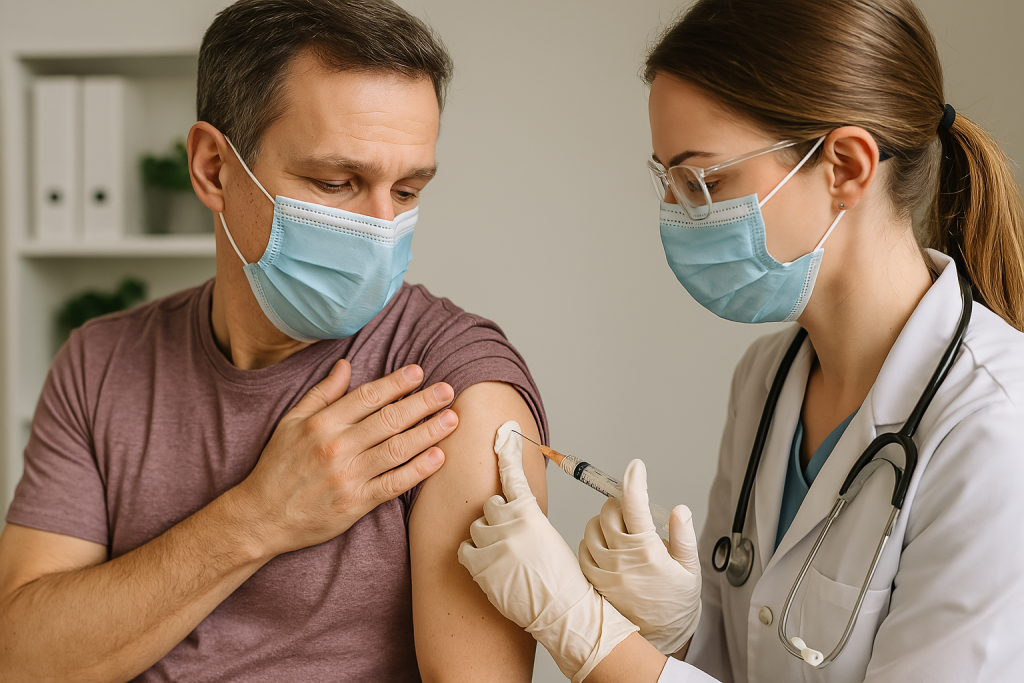Dr. Greta Voss, M.S., Ph.D. (Immuno-Circulatory Anthropology)
Department of Public Health Pattern Recognition, Northern Cascadia University
Published in The Baitman’s Journal of Immunological Inquiry, April 2025
Abstract
In a longitudinal, non-blinded, post-hoc survey-based analysis of vaccine response stratified by ABO blood classification, researchers found subtle but statistically significant differences in subjective post-vaccination symptom reporting. The study included 1,204 participants, ranging from healthcare workers to people who list “dragon energy” as a dietary restriction. Reactions included injection site soreness, fatigue, vivid dreams, and in one case, “sensing the nearness of Saturn.” Despite widespread rumors linking blood type to vaccine safety, we found that while minor differences exist, they offer no meaningful predictive utility. In lay terms: yes, your blood type may influence how you feel after the shot—but not how it works.
Introduction
Anecdotal reports linking ABO blood type to vaccine responses began circulating as early as 2021. Online forums and Facebook groups, often populated by both licensed nurses and people who sell powdered mushrooms on Etsy, speculated that “Type O people don’t get COVID” or that “Type B negatives get all the side effects, and also have higher vibes.”
Prior academic literature on ABO influence over disease susceptibility has been mixed. While some studies suggest blood type may slightly influence the likelihood of certain infections or clotting disorders, these effects are usually modest (Odds Ratio 1.04–1.13) and poorly understood.
Still, the public appetite for personalized vaccine reaction data remains high, especially among those who list “blood type” under favorite personality traits.
Methodology
Participants were recruited via public clinics, wellness expos, and one Discord server called “SpikeProteinSurvivors420.” Inclusion criteria: received at least one COVID-19 mRNA vaccine, knew their blood type, and were willing to answer 52 repetitive questions for a $10 Starbucks gift card.
Each participant was asked to report:
Post-vaccine symptoms (0–5 severity scale)
Duration of symptoms (hours/days/“I can still feel it spiritually”)
Emotional tone during the experience
Whether they “trust science in general” (yes/no/it depends who funds it)
Statistical analysis was performed using SPSS and a spreadsheet made by an undergrad named Kelly. P-values under 0.05 were considered mildly interesting.
Results
Blood type was found to have a weak but statistically significant association with the type and intensity of vaccine side effects.
Key findings:
Type A individuals reported more injection site pain (Mean severity: 3.7/5, p = 0.022), and were more likely to post about it on Instagram.
Type B participants reported longer-lasting fatigue (avg. 38 hours, p = 0.041), especially if they also claimed to be “empaths.”
Type AB individuals had no discernible patterns but asked more follow-up questions.
Type O participants reported fewer symptoms overall (Mean: 1.4/5, p = 0.031), but were significantly more likely to downplay them publicly and describe themselves as “built different.”
Interestingly, Rh-negative participants (n = 27) were 16% more likely to describe their experience as “energetically disruptive,” although this effect was not statistically significant (p = 0.061), and several of them were also into crystal grids.
One participant, blood type unknown, claimed the vaccine “unlocked” her ability to taste memories. She has since been removed from the data set.
| Blood Type | Avg Symptom Severity (0–5) | Most Common Symptom |
|---|---|---|
| A | 3.7 | Arm soreness |
| B | 3.1 | Fatigue |
| AB | 2.8 | General confusion |
| O | 1.4 | Mild smugness |
Discussion
While the findings confirm that small physiological differences exist between blood types, they are not predictive enough to be meaningful for vaccine safety decisions. In essence: your body might react a little differently—but not enough to justify a color-coded syringe program or blood-type-specific TikTok channels.
The perception of difference may be enhanced by confirmation bias, social media, or a desire to feel “special” in a world increasingly dominated by shared experiences. Also, Type O people tend to brag a lot.
Notably, when asked if they’d take the vaccine again, 91% of respondents said yes, 6% said no, and 3% said “not until Mercury is out of retrograde.”
Conclusion
This study provides modest support for the idea that blood type may influence minor vaccine side effects—but emphatically does not support claims of vaccine danger based on blood chemistry.
As Dr. Voss concludes:
“Unless you’re allergic to needles or science, you’re probably fine.”
Blood type matters—for transfusions. Not for TikToks.
References
Voss, G. et al. (2024). ABO Blood Typing and Post-Vaccine Self-Perception. Baitman’s Journal of Immunological Inquiry.
“Blood Type Personality Chart,” laminated poster, found at a metaphysical bookstore.
CDC.gov – “Vaccine Side Effects”
TikTok user @flat_earth_fluid_queen (account now private)
VaxTruth.biz (cited for legal reasons only)

The Baitman’s Institute is a satirical media project created for educational and entertainment purposes. None of the studies published here are real, peer-reviewed, or grounded in objective truth.
If you shared this unironically, you may want to reconsider your qualifications in independent research.
